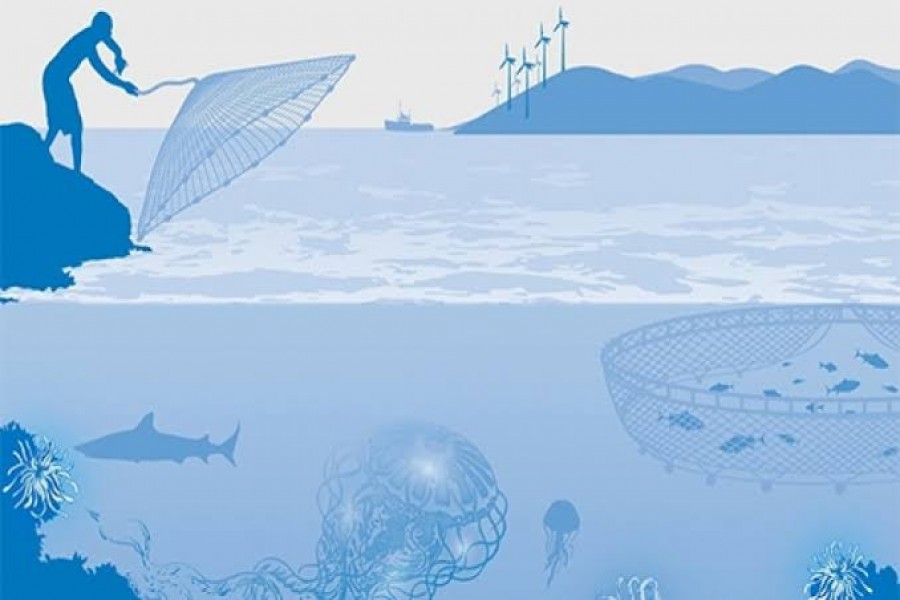Following the approval of the Bangladesh Maritime Zones Act, 2019 by the Cabinet last week, doors are now wide open for the country to explore and exploit the rich marine resources of the Bay of Bengal and exercise the country's right over the extended maritime boundary.
The new Act has replaced the Territorial Waters and Maritime Zones Act, 1974. It is said to be more comprehensive and is expected to help Bangladesh exercise its right to tap enormous potentials of the country's blue economy.
The Act, according to reports, has 14 chapters and 137 sections dealing with a number of maritime related issues which were absent in the previous Act. It has several new and contemporary issues such as maritime terrorism, ocean governance, exclusive economic zone, submarine cable, anti-piracy, criminal and civil jurisdiction in sea vessels and nuclear waste transportation etc.
According to the definition of the Act, Blue Economy is comprised of economic activities that directly or indirectly take place in the seas, oceans and coastal waters using sea/oceanic resources, exploration and exploitation of ocean resources in a sustainable manner.
There is also the provision for appropriate use of ocean and coastal waters and ocean products as main inputs, making use of goods and services to support activities of the oceans and seas and protection of the ocean environment.
The Act also details the outline and shape of the Exclusive Economic Zone (EEZ). The EEZ of Bangladesh comprises an area of the sea beyond and adjacent to the territorial sea extending to a line every point of which is at a distance of 200 nautical miles from the nearest points of the territorial sea baselines/normal baseline of the nearest coastline.
The Act says: "In accordance with international law, Bangladesh has several rights which are sovereign rights for the purpose of exploration, exploitation, conservation and management of the natural resources, both living and non-living, as well as for producing energy from tides, currents and winds."
Bangladesh will also have exclusive right for the construction, maintenance or operation of artificial island, offshore terminals, installations and other structures and devices necessary for the exploration and exploitation of the resources of the zone or for the convenience of shipping or for any other purposes.
According to the Act, Bangladesh government may make regulations to provide for the authorisation of persons or organisations to explore natural resources, or to recover or attempt to recover any such resources, in accordance with such terms and conditions as may be determined by the government.
With the adoption of the Act, the government has, of late, given utmost importance to blue economy and set a time-frame to start exploring the marine resources within the next few years.
The concept of the blue economy was, in fact, conceived at the Rio+20 United Nations Conference on Sustainable Development held in Rio de Janeiro in 2012, viewing the idea as an alternative economic model for sustainable development that puts the oceans at the centre of this approach.
Analysts, however, believe that the concept of the blue economy is complex and it will take time to develop human resources and technological capacity to discover marine resources. It conceptualises oceans and seas as 'Development Spaces' where spatial planning integrates conservation, sustainable use of living resources, oil and mineral wealth extraction, bio-prospecting, sustainable energy production and marine transport.
The government has set up Bangladesh Institute of Marine Technology (BIMT) and introduced oceanography in the curriculum of two public universities to carry out research in the Bay of Bengal. There were only two marine academies in the country in 2009, currently there are 22 such academies. The government has also commissioned a survey vessel to conduct a study on fisheries in the Bay of Bengal. The government is also taking up a plan for exploring marine resources in the Bay of Bengal within the next two years.
The country's first ocean research and survey ship is conducting the survey since 2016 to find out marine resources in the Bay of Bengal. Under the move, the Ministry of Fisheries and Livestock launched a project titled Bangladesh Marine Fisheries Capacity Building at a cost of Tk 1.65 billion. The government is keen to complete the initial survey in the Bay of Bengal to ascertain the marine resources in a short time.
The World Bank is also providing funds worth Tk 99 million for study on the offshore turfs under a technical assistance project for spotting the potential of the blue economy in the Bay of Bengal.
The WB consultants are expected to prepare a development project proposal (DPP) for an investment project based on the survey results where the clear path of exploring potential resources in the Bay and their contribution to the macro-economy would be detailed out. The WB will also help Bangladesh under its 'Sustainable coastal and marine fisheries project' in exploring the untapped resources of blue economy.
Formulation and effective implementation of plans is a demand of the time for economic wellbeing of the region, which can be achieved by efficient use of sea resources. The government aspires to formulate required policies pertaining to all important issues using the Indian Ocean Naval Symposium (IONS) as a dialogue platform.
While geographical borders divide the countries in the sub-region, analysts believe that friendship across the ocean can unite them in a more desirable way. The IONS is not only a ray of hope for the Indian Ocean Region but also a forum of immense importance for the Asia-Pacific and the adjoining regions.
A healthy ocean is essential for leading a better life but oceans are at risk now due to over-fishing, marine pollution and global climate change. Overcoming those challenges and sustainable development of marine resources are the key to global economic growth.


